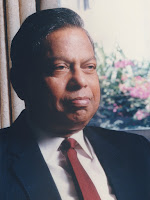Telecom in India - CAS to be Phased Out. Most Roof-top Transmission Towers to Disappear from Cityscapes. Domestic VOIP to become Legal.
Kolkata
TRAI Chariman, Dr. J S Sarma, IAS addressed an interactive session at the Bharat Chamber of Commerce on 8th June 2010. Among others, he said that Indian mobile telephony customer base which is currently 600 million will go up to 1 billion in 2014. His main presentation is reported in today's media and is not reiterated here.
At the end of his presentation, during an interactive session, along with others, I too had the opportunity of raising a few issues. My questions and Dr. Sarma's responses are given below because these are all matters of great public interest.
Q-1: What is the future of the conditional access system (CAS)?
Trai Chairman's response: The conditional access system will be phased out in about 5 years by which time CAS will be replaced by a new digital transmission technology.
Q-2: Aside from hurting the cityscape, are roof-top transmission towers also health hazards for the neighborhood?
Trai Chairman's response: In the normal course of their functioning these towers do not pose any health hazard. However, in the event these towers were used to rush through a heavy bandwidth, (here he chose his words carefully), there could be some potential health hazard. He then reassured the audience that Trai is currently working on a strategy by which these transmission towers will relocated only at a few selected strategic locations and not everywhere as it is today. The function of the many towers that would be removed will be taken over by: (i) optical fiber cables that will be laid underground in dense municipal areas, and (ii) small dishes operating on low frequency that will be located on building walls, and cover small footprint areas. However, he did not specify a time line for this.
Q-3: In India, Voice over Internet Protocol (VOIP) is legal only for international calls but not for domestic calls, while in many other countries it is legal for both domestic and international calls. Why is it so?
Trai Chairman's response: Currently, this is being looked into and probably in future VOIP could be legal in India for domestic calls as well. He said there were various constraints for which it is not legal at this time but he did not want to elaborate on those constraints.
Q-4: During the PM's recent visit, mobile network was simultaneously jammed over large areas of J&K. While we certainly do not want the PM's security to be jeopardized in any manner whatsoever, but given the fact that the network is crucial for trade, industry and personal communication, couldn't you have restricted the jamming to a smaller local area of, say, something like 5 sq km surrounding the PM's location? Is the technology available for this?
Trai Chairman's response: Yes, the technology is available. Why 5 sq. km, the network can be jammed, if desired, in a very small selected area, as small as this auditorium. So the technology is very much there. Beyond this he did not want to comment on the size of the area in J&K in which the network was jammed simply because he didn't know the size of that area. Also, even if he did, he would not comment on it in any way because this was entirely a security matter that had nothing to do with Trai.



Comments
Post a Comment